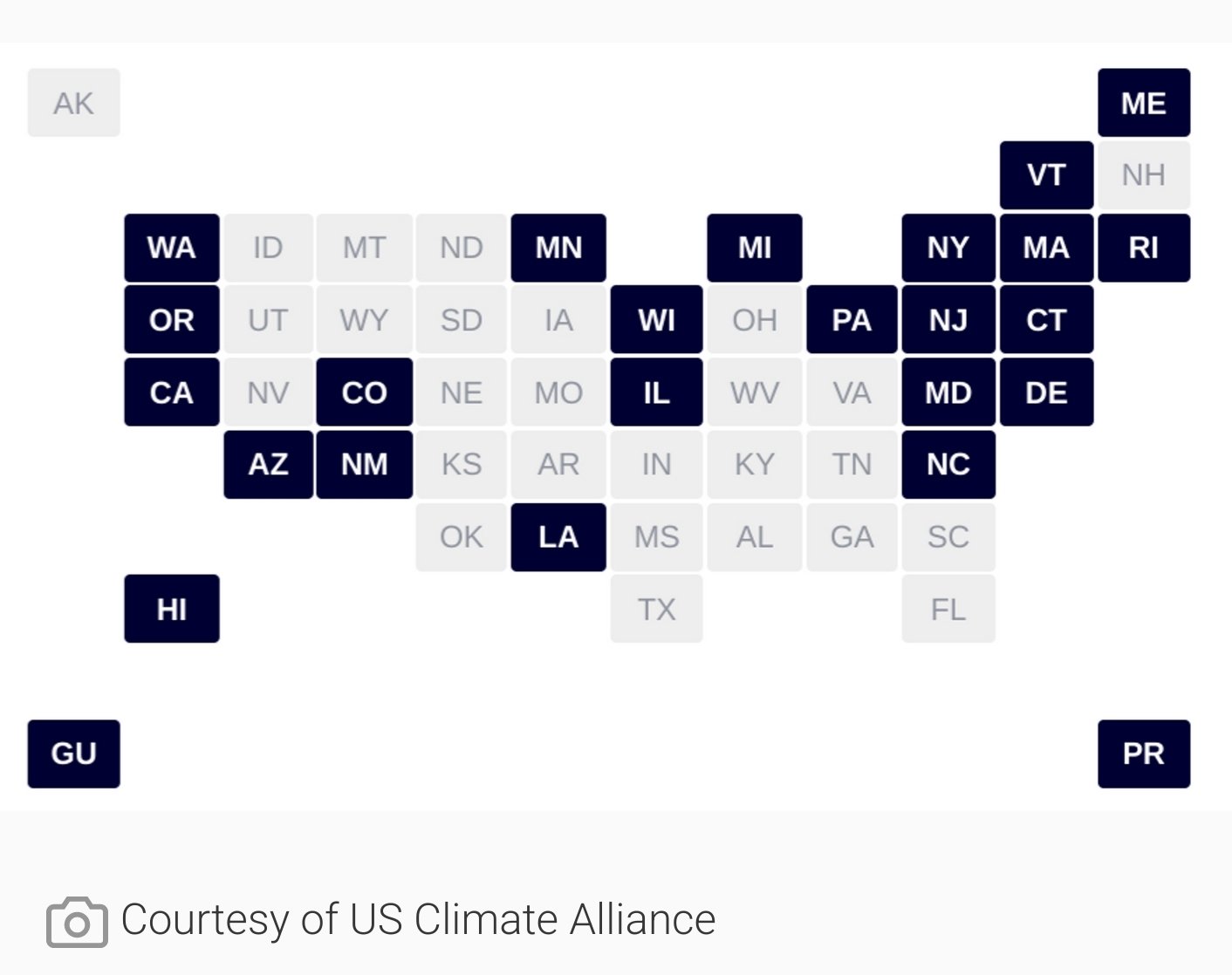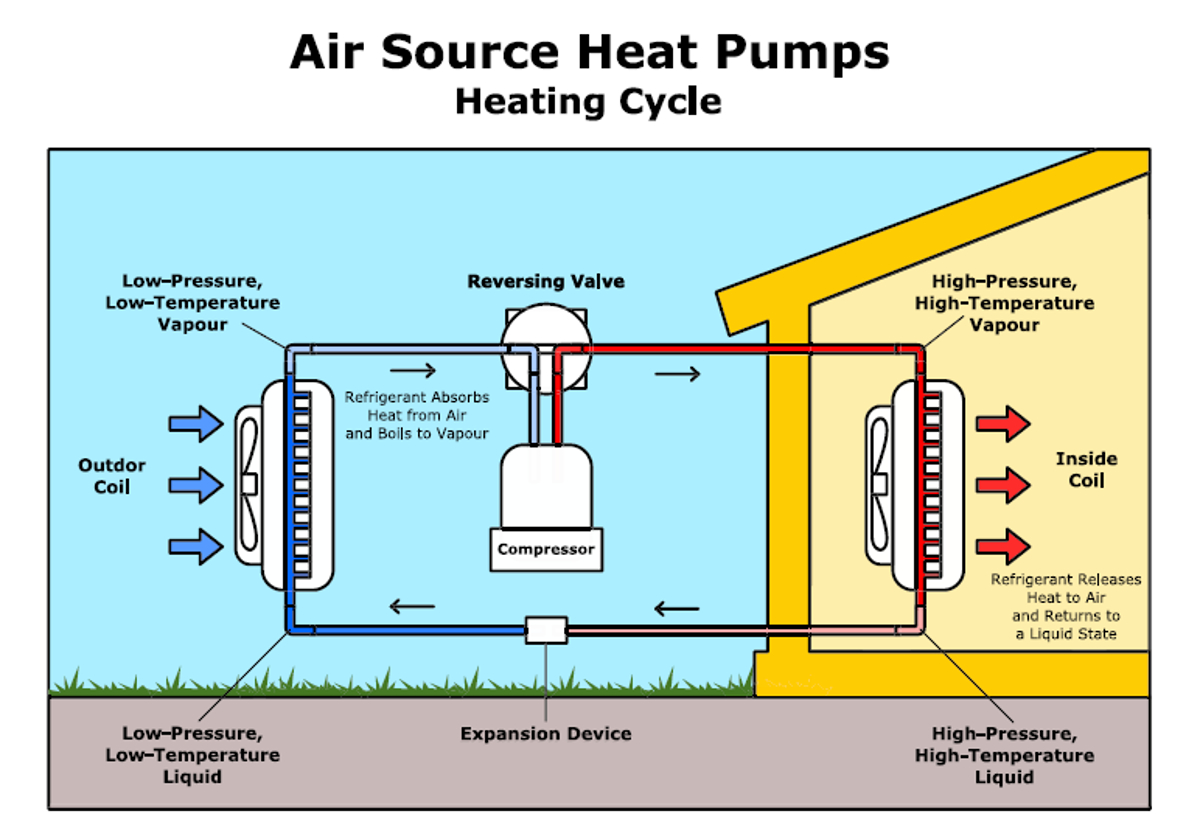25 States Agree To Quadruple Number Of Heat Pumps In America::The US Climate Alliance met in New York City this week to explain the benefits of heat pumps, including better health for American families.
25 states agree to do something productive
lemme guess which 25
For those who don’t want to guess:
 Guam and Puerto Rico were counted as states.
Guam and Puerto Rico were counted as states.What are they trying to do with that map? Why not just use a regular map so LA isn’t west of TX?
People try and make maps of the states where everyone is equal sized a lot for graphics because it’s hard to label smaller states in an easily readable way. This messed up the geography though as seen above.
That looks pretty blue (off the top of my British head).
It’s has most of but not all the blue states but there’s also red ones too.

Wtf, North Dakota and Montana?
You guys stand to benefit from this.
.
Of course, they also have oil wells, don’t they…
Bingo
What is that map? Y’all seeing this?
Didn’t realize Kansas was next to Louisiana… super weird
Must be the app you’re using, I see a diagram of a heat pumps operation.
I think they mean this graphic from the article. Looks like the periodic table of states.

Yeah, that’s some stupid looking shit.
This map is amazing. Whoever made it probably lives on the west coast.
“Where should we put Wisconsin, south of Michigan right?”
“Sure, why not, geographically part of Michigan is north of Wisconsin.”
“Ah, oops, I ran out of room for Indiana”
“Put it south of Illinois, no one will notice. Right next to Arkansas, it’s fine.”
I also like land-locked New Jersey.
The way they shuffled the Midwest hurts my soul.
It’s annoying they don’t have a footnote about it, but it’s the map of the 25 “states” that have agreed to do what the headline says/form the coalition. I put states in quotes because it includes Guam, which is a territory not a state, so the headline is a little misleading.
The article doesn’t say just how much more expensive heat pumps are when comparing to gas furnaces. I live in one of the states at the top of that picture and just replaced my 20+ year old furnace and AC compressor. I specifically asked about heat pumps and they were reluctant to even price it out for me. It was over twice the cost. In addition they said the area I live in would almost certainly require an aux heat source, which they recommended gas for because direct electric heat is so horribly inefficient. I ended up going with the 98.5% efficient gas furnace, which also came with incentives and rebates from the power company.
Direct electric heat is very efficient. Practically 100%.
My understanding is that you would only need the aux source during extreme cold. So very rarely.
Right - in fact, from my knowledge, heat pumps only see use over direct electrical heating because they are effectively more than 100% efficient. They move more heat energy from outside to inside than they use in the transmission.
The breakdown between gas and electric heating isn’t necessarily a matter of how efficiently the energy is used once it gets to the home, it’s how expensive it is to get it there in the first place. In a lot, if not a majority, of places, it’s much cheaper to get gas piped in than it would be to pay for the same amount of heating via direct electric resistance. Heat pumps change the equation because they can make electric heating in places that don’t get outrageously cold economically competitive with gas.
My heat pump is around 300% efficient. It adds 3X the energy into the house than it spends by stealing that energy from outside.
Except when it’s very cold outside, which is what was discussed here. Heat pumps are great (have one in my home), but it might not be ideal in very cold areas, especially if electricity prices are high compared to other energy sources.
That’s a misleading number. In most other cases where we are using electricity–motors, CPUs, lighting, etc–we consider the heat generated to be inefficiency. It might be more accurate to say that electric resistance heating is 100% inefficient.
If you’re using resistance heating to heat your home, using electricity that’s originally produced by natural gas, then you’re using more natural gas compared to burning that gas for heat directly in a home furnace. Now, electric resistance heating can be a choice when it’s fed by clean electrical sources otherwise. Even then, though, you would prefer a heat pump if possible.
What do you consider “extreme” cold?
I don’t know. It’s a curve though, not a cutoff.
And what is the problem with a gas hybrid heat pump? It’s an ideal solution for places that get very cold, use the gas furnace for the weeks when it’s below -5 and use the heat pump for many months around that. It’s one of the most efficient ways to use a heat pump as you don’t have to bully it through the coldest part of winter with very bad COPs, you’re only using it when it’s most efficient. And when your heating period is very long, that will only benefit your seasonal COP. So of course it’s more expensive than a simple furnace, but it will also save loads of energy and redeem itself after 5-10 years.
The best part about this is you already have an AC, aka a heat pump, but you don’t use it for heating?
I live in New England and gas hybrid is what I looked at. I’m sure it would be very effective, while greatly reducing various air pollution. They quoted $22k to replace my existing furnace and ac, and this was before the big round of price gouging. That is a lot of money.
I live in southern Wisconsin, and that’s about what they quoted me in the past year for a top of the line system of both the AC and furnace. That’s a multi-stage system that runs at a low level all the time (that’s the most efficient way to run it). This is before tax incentives.
A more basic system was around half that cost. If your AC and furnace need replacing, anyway, it’s not much more.
Tbf, minimum cost is going to be $4k, so for him/her the minimum was $8k. We don’t know their financial situation but that is a lot of money to cough up.
Thing is, it’s not much more than replacing the AC/furnace, anyway. They only last around 20 years. Often less, because people don’t do preventative maintenance on them.
Totally agree, but not everyone has the finances to do a big upfront cost like that. Same story as the $10 vs $50 pair of shoes from a century ago.
First off, that’s what government incentives are for. Exactly the sort of program that OP is pointing towards.
Second, this stuff breaks eventually. That’s part of home ownership. I realize this isn’t a perfect solution, but you really do need to plan for this sort of thing. In the case of my wife and I, we were easily able to cover it with a home equity loan (along with solar panels and a new rood and a few other things). We could only do that because we’ve been in the same house for over a decade, live in an area with rising house prices, and have good credit. These things will easily pay for themselves in the long run, so the home equity loan makes good sense.
But I’m fully aware not everyone can do that. This is a place where government needs to step in to do it faster.
https://www.youtube.com/watch?v=MFEHFsO-XSI
I’d explain, but he does it better.
For anyone thinking about watching this video, it’s GREAT, and has a ton of other interesting tech videos on the channel.
Here is an alternative Piped link(s):
https://www.youtube.com/watch?v=MFEHFsO-XSI
Piped is a privacy-respecting open-source alternative frontend to YouTube.
I’m open-source, check me out at GitHub.
The article does eventually mention that heat pumps cost more, plus replacement rate is limited by when existing stuff goes bad., after way too much filler text.
Of course they gloss over it a bit and use an example “ if a heat pump cost $5,000 …”. If I could do that, I would have. I did get one quote before giving up, and even if you read it as “$5,000 more than conventional options…”, it’s not close to that either.
However the biggest problem with the article is claiming that being more efficient means less operating costs and make a claim about how much money you’ll save. Sure, they’re very efficient , but it’s more complicated than that. Where I live, the preferred alternative is natural gas, and it’s price per energy is much cheaper than electricity, so you’d save very little, if any
I was renting a place while rehabbing my home. We completely removed the natural gas from our house and went induction range, electric oven, heat pump water heater and heat pump air conditioner/furnace. The place we were renting was about 3 blocks away. It had an old but not terribly old gas furnace, standard gas range and oven, gas water heater, and no air conditioner. It turned out to be a really great way to compare the two setups. One mostly gas, somewhat inefficient (which is standard out there), the other ultra modern power saving equipment throughout the house. The rented place had baseboard heating as well, but that is so wildly inefficient that we turned them off and never used them. Sweet jesus it was like lighting cash on fire.
My last bill gas + electric at the old place was $210. My first full month bill at the new place was $90, and that includes an AC running at the new place that didn’t exist at the old place.
It is a shocking level of savings, and we aren’t even in winter yet where my gas bills at the inefficient place would regularly hit $200.
The first 4 HVAC companies I called told me the same thing. They said I had to have a back up natural gas or resistance based electric heater. They don’t know what they are talking about. My current heat pump can operate down to -30 C. The coldest it ever gets here is -16 C and that’s only for a few hours per year.
I’m going through this right now with my state (MA). After a lot of talking and finding non-shit vendors and quotes and stuff I’ve got an application into the state program. About $28k total to remove oil from my home completely in favor of heatpumps and a new water heater. State will give us a 10k rebate and a loan where they pay 7 years of interest. So that works out to 10k upfront we get back and then 7 years of $225/month payments.
We pay $300/month for oil. And that price is always getting higher.
Why so expensive? That’s the price of our geothermal system with its really expensive well.
5 indoor units, 2 outdoor units, new water tank, electric work, boiler and oil tank both got to get chopped up safely before being brought out. Went through several vendors to get the project under 30k.
And it’s New England so the heat pumps have to be hyper heat units that function in winter. We are getting units that will heat to 70 degrees inside at -13deg outside and functions down to -22. (All F)
Ah. That explains it. Mini split?
Yeah. Our duct system is absolutely awful. We looked into mini splits to solve the problem before the geothermal. The ones with multiple heads were just ridiculous.
We did later finish our attic and put one up there. It’s awesome.
Maybe I am just not seeing it, but are there any links to find info on using the program?
There is no program yet I suspect, this is just a commitment to develop programs in each state. Some might already have them, but probably not big enough.
I live in Canada. I paid $13,900 for a heat pump. That includes the installation, removal of my natural gas furnace, and the engineering inspections. I got a $6,300 rebate from the Federal government. I got a $6,300 rebate from the provincial government. So all in I only paid $1,300 out of pocket. In the summer especially I save about $250 per month using the heat pump instead of the multiple portable AC’s we had. Its paid for itself in under a year for sure.
It was a lot of work to get. Tons of HVAC companies I called told me heat pumps don’t work in our climate. That’s not true. The heat pump I have works till -30 c which never happens here. They insisted on installing a natural gas furnace and a Central AC. One of them quoted me $26,000 for a heat pump that was so inefficient it didn’t qualify for any rebates. Multiple other HVAC companies just didn’t respond when I insisted on a heat pump. NEEP’s heat pump list was very helpful in fact checking the stuff they told me. I finally found a small one man shop who was awesome but it took a lot of hard searching.
Getting the rebate was also a big ordeal. I had to pay for everything upfront. I researched the rebate process and made sure to have all the paperwork lined up. I had to get an engineering inspection of the house done before and after so I could compare the reports to prove my carbon footprint improved. If you accidentally get the heat pump installed without doing the before inspection you don’t qualify. Even with all my paperwork it took 7 months to get the final rebate. Multiple times they called me saying I hadn’t submitted a required report. I had everything on file and would just resubmit what they were looking for. I’ve spent many hours waiting on hold. Its pretty clear they are trying to save money through being inefficient.
It is worth it in the end. I’m very happy with the heat pump. The process is not easy. I imagine most people would just accept the HVAC companies recommendation and get not get a heat pump which is unfortunate.
Which province and where? I’m genuinely curious and willing to jump the hoops for my little semi.
Chilliwack BC.
You can see the Federal rebates here: https://natural-resources.canada.ca/energy-efficiency/homes/canada-greener-homes-grant/start-your-energy-efficient-retrofits/plan-document-and-complete-your-home-retrofits/eligible-grants-for-my-home-retrofit/23504
You can see the BC Provincial rebates here: https://www.betterhomesbc.ca/heatpumps/
It looks like the amounts have changed a bit since I did it. If you are in the lower mainland area I highly recommend Positive Solar Energy HVAC Plus. I’d link the site but it looks like its down. Joel is the owner and he is a lot better at installing heat pumps and solar panels then running a business.
Sweet. I have oil-fired hydronic baseboard heat and indirect DHW. Live in Massachusetts. Does that mean they’ll be some good deals on moving to air-to-water heat pumps?
And what about the 1-3 days a year when ambient is outside of operating range? Bundle up in front of resistive space heaters?
I’m from North Carolina, heat pumps are pretty common here, I grew up in a heat pump only house.
The system has resistive strips, sometimes labelled “emergency heat” on the thermostat. Those can provide heat when the outside unit can’t; and I believe they are used to defrost the outside unit.
There are “hybrid” systems that include a furnace rather than resistive heating elements. If it gets so cold the heat pump can’t handle it, it lights the furnace. This is perhaps an upgrade for folks who live with an air conditioner plus furnace system; basically your furnace doesn’t light as often, instead your air conditioner runs in reverse.
Where in North Carolina? I’ve grown up and west NC, have since moved to mid-NC, never seen a house with a heat pump.
That number almost certainly includes my state WA, with its 8.5 months of rain, and only 3 and a half nice months in which there are just 4-7 summer days when an AC would really be needed. While we usually wear raincoats for Christmas instead of snowcoats, cold snaps are getting more and more severe and common, and on some years these days we have a difference of up to 80 degrees between the coldest day (usually in February) and the hottest (usually in July).
Not sure where in Washington you are, but from Portland to Everett we had 3 months of over 70 weather, and many, many days over 80 this summer. My house doesn’t have tree cover and gets warm, even though I have brand new r40 insulation on my attic. I ran my portable AC nearly every day to keep my bedroom cool enough to sleep.











